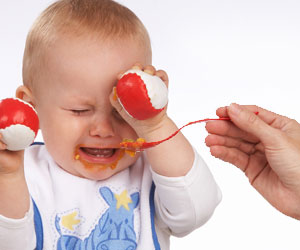Fussy eating habits of children can be challenging but continue to make healthy food and with time, your child's appetite and eating behaviors will evolve.
- Some children are fussy eaters due to food, taste preferences and pressure to adopt eating habits
- Fussy eaters have low immunity, low weight for age and low height
- Parents need to introduce one new food a day and should be patient while tackling your child’s fussy habits
Five Reasons Why Your Child is a Fussy Eater
Taste: Children are born with a natural preference for sweet tastes. They crave higher levels of sweetness compared to adults. For example, they may not enjoy having vegetables as much as a sweet treat which turns them into reject healthier food and makes them a fussy eater. As they grow up, kids may increase their liking for bitter or sour food with repeated exposure and if they are accompanied with something sweet and as their taste buds evolve.Distraction and appetite: Have you ever considered spacing out the timings of meals and snacks for your children? It may often happen that snacking close to mealtime may reduce their desire to eat the meal and hence take the edge off their appetite. It is essential to structure mealtime and snacks, especially without any screen in front of them. Screen time during meals can lead them to overeat when they grow up or simply not eating enough.
Spoon feeding: Children will, of course, eat more if their plates are loaded with food by a parent, but that is not what we are looking for in the long run. The aim for young children is for them to internally understand their hunger cues and fullness quotient. It’s best to let them self-feed under parental supervision to naturally know and remember the feeling of fullness.
Activity levels: If your child has been running around the park during holidays, has had a busy day or has over-exerted his/her brains by visiting a new place or learning a new thing, it leads to an increase in appetite. If they have no physical activity at all, in that case, they might not want to eat as much as they usually do. This essentially means tiredness and activity levels have a direct impact on children’s appetite.
How to Tackle Fussy Eaters?
Fussy eating is not just frustrating for parents, but it also leads to low immunity, low weight for age, and low height. You can tackle your child’s fussy habits and teach the importance of healthy eating habits in the following ways.Create a family table without any electronic devices or distractions where everyone eats together.
Make it fun: Be creative in how you present healthy but not necessarily tasty food. Add veggies to their favorite pasta, and add a side of dipping sauce to the plate of broccoli. Have fun with it!
Nutrition fundamentals that apply to all kids; whether your children eat everything, are picky eaters or will try anything once, it’s important for them to get the right mix of nutrients that will help them develop healthy bodies, strong bones, and bright minds.
The following are the food groups and nutrients a child’s meal plan should consist of:
- Protein: For building muscles, other tissues, and a healthy immune system
- Fruits and vegetables: For a nutritional fiber intake, source of vitamins & minerals
- Grains: As a source of carbohydrates and energy
- Iron: For making healthy red blood cells that carry oxygen through the body and prevent anemia
- Vitamin D: For strong, healthy bones
- Calcium: It helps build strong bones
- Healthy fats: For brain and nerve development, they also aid nutrient absorption
- Vitamin C: For a healthy immune system, healing, and absorption of iron
Source-IANS










